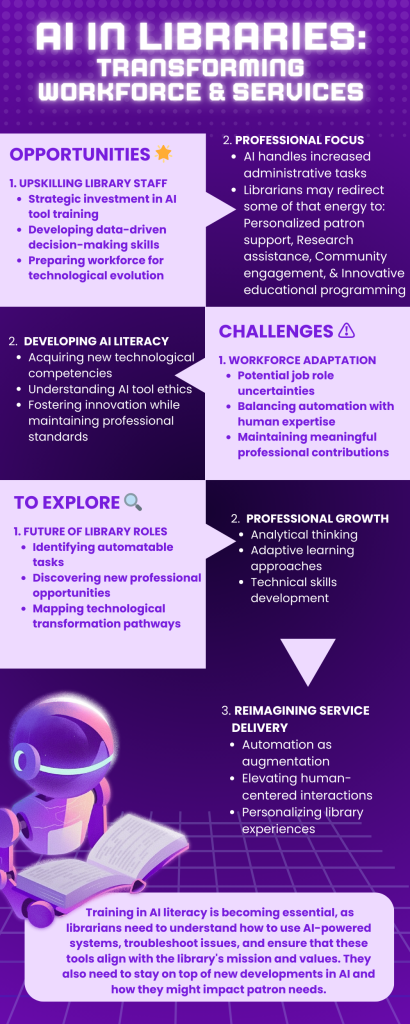Libraries are on the cusp of a technological revolution, with artificial intelligence (AI) poised to reshape service delivery and operational strategies. Experts predicted that by 2025, AI would fundamentally transform libraries into more technology-driven, user-focused institutions (Pew Research Center, 2021).
The Krupp Library’s ChatGPT Perspective discusses how AI tools are being integrated into library systems to assist with research, reference services, and customer interactions, already enabling libraries to provide augmented services, including 24/7 real-time assistance through intelligent chatbots and personalized resource recommendations. As AI automates routine tasks like cataloging, digitization, and metadata tagging, librarians are freed to focus on more creative and strategic work (Inside Higher Ed, 2023).
However, this technological integration is not without challenges. Library professionals must develop new skills, particularly AI literacy, to effectively manage and leverage these emerging technologies. The ability to troubleshoot AI systems while maintaining human-centered services has become crucial (SJSU, 2023).
The evolving role of librarians now encompasses not just traditional information management but also serving as guides in an increasingly digital information landscape. They must critically evaluate AI tools, ensure ethical implementation, and help patrons navigate complex technological resources.
As libraries adopt AI, the goal remains consistent: leveraging technology to improve access, personalization, and engagement while preserving the fundamental mission of supporting learning and community knowledge.
I also created this infographic that explores areas of AI as a support tool that augments, rather than replaces, intersecting technological innovation with human-centered services.
References
Anderson, J., Rainie, L., & Vogels, E. A. (2021, February 18). Experts say the ‘new normal’ in 2025 will be far more tech-driven, presenting more big challenges. Pew Research Center. https://www.pewresearch.org/internet/2021/02/18/experts-say-the-new-normal-in-2025-will-be-far-more-tech-driven-presenting-more-big-challenges/
American Libraries Magazine. (2019, March 1). AI and machine learning in libraries. https://americanlibrariesmagazine.org/2019/03/01/ai-machine-learning-libraries/
Inside Higher Ed. (2023, May 4). Getting a grip on ChatGPT. https://www.insidehighered.com/opinion/views/2023/05/04/getting-grip-chatgpt
Krupp Library. (2023). ChatGPT: A library perspective. Bryant University Library. https://library.bryant.edu/chatgpt-library-perspective
Moriarty, T. (2023, March 1). Chatting with ChatGPT: Deep dive in five with Tom Moriarty. San José State University NewsCenter. https://blogs.sjsu.edu/newsroom/2023/chatting-with-chat-gpt-deep-dive-in-five-with-tom-moriarty/
@Angela I really like your info graphic, and it presents a useful way for librarians to think about AI and how it might enhance their jobs and the jobs of others in the institution. Here’s a total aside. I just found out the ChatGPT can take a list of meeting times and convert them into a file that can be imported into my calendar. I had no idea it just saved me a ton of time and that’s what we want for our colleagues in libraries.